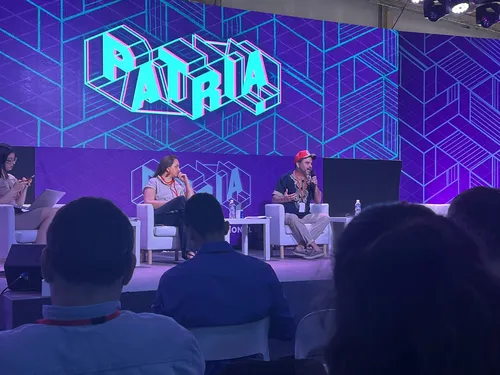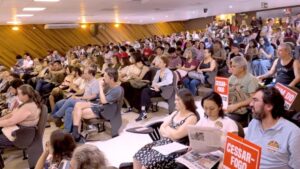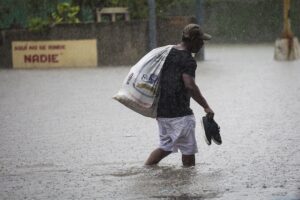
“The Revolution must be communicated. If Martí lived in today’s Cuba, he would be the driving force behind this Colloquium,” said Ronquillo Bello, president of the Union of Cuban Journalists, in front of an auditorium packed with more than 200 participants at the opening of the conference. 3rd Patria International Colloquium.
This is the third consecutive year that the event has been organized in Havana. A meeting that brings together journalists, academics and influencers with the aim of debating and exchanging experiences in progressive and left-wing communication. Over several days, different topics are discussed, such as artificial intelligence, the legal, economic and narrative challenges of activism in networks in the Global South. The current situation and possibilities of a new international order of information and communication are also addressed.
“The purposes of this event will only be fulfilled when the humble and abandoned people of the world rise up to defend their projects of justice in the face of all manipulation”, concludes Bello in his opening speech.
The name of the event comes from the famous newspaper Patriafounded in 1892 by Cuban independence fighter José Martí as an organ to disseminate the ideas of the Cuban Revolutionary Party (PRC), which fought for the independence of Cuba and Puerto Rico from Spanish rule.
This year, the meeting was attended by television channels Telesuror pan-Arabist Al Mayadeen e o canal on-line The Iguana TV. Other participants included important left-wing theoretical journals such as New Left Review, Monthly Review e Jacobinthe Tricontinental Institute for Social Research and news portals Dongsheng News e Opera Mundi.
During the conference, tributes were paid to journalists Farah Omar and Rabih Al-Meemari, from Al Mayadeen, two of the more than 134 journalists murdered by the Israeli State in Palestine.
The first Colloquium was held in 2022, on the 130th anniversary of the newspaper’s founding. In its three editions, the event has changed its format. This edition has a much broader and more plural perspective in its call, compared to previous editions.
The different lectures presented were open to the public and can be seen on YouTube.
A platform to articulate left-wing forces
Pedro Jorge Velázquez, a young Cuban communicator, explains to the Brazil in fact that “what interests Cuba most is the articulation of these left-wing forces, left-wing communication, which are spread across the continent and often do not touch each other.”
For just over three years, Velázquez has been the driving force behind the Fool, one of Cuba’s main independent communication projects. Designed as a space for political activism and communication on social networks, Fool was born with the recent expansion of Internet services on the island, which has only had mobile data for five years.
“I don’t think Cuba wants to profit from an event like this. Or that it exists to defend Cuba’s position in the world or anything like that,” he says.
For the young journalist, the event is a space for mutual learning and articulation of communication experiences. According to him, it is through this same articulation that “the left and progressives could strengthen their own agendas in popular struggles and just causes.”
“I believe that this event means for Cuba to continue the internationalist tradition founded by the Cuban revolution.”

Cartaz com Ernesto “Che” Guevara and Fidel Castro / Coloquio Internacional Patria
Take position
“Communication is not something isolated from the economic, social and ideological form of production. Communication is also an expression of class struggle. That is why, on the one hand, corporate media is formed, but also, on the other hand, militant media as part of the fight for common sense”, reflects journalist and popular educator Alina Duarte, who is part of the communication project Root, to Brazil in fact.
Root is one of several communication initiatives that aim to tell the reality of Mexico and the continent in light of the logic of media corporations. Duarte feels part of a broad ecosystem made up of many communication projects that have been created in the country in recent years.
Six years ago, the arrival of Andrés Manuel Lopez Obrador’s progressive government provoked a series of changes that reordered Mexico’s political and social map. Duarte states that the emergence of alternative communication projects is an essential part of the transformations that have been taking place in the country. However, even though she is a member of the political project led by Andrés Manuel López Obrador, the young journalist is very emphatic when it comes to outlining what the tasks of communication projects should be.
“Often we don’t fully realize that we don’t need to defend the State or a government. In the independent media today we have to embrace the causes. I often think we don’t understand that it’s not about embracing parties or embracing governments. But embracing social justice, embracing feminist struggles, embracing social achievements that have historically cost many lives and a lot of work, a lot of tears, sweat and blood. This is sometimes dissipated by the immediacy of what political processes mean.”
Therefore, for the young activist, the media, in addition to fulfilling a strictly informative role, has the enormous challenge of providing pedagogical tools for the battle of ideas.
“I think there is an urgency. There is a direct urgency to embrace these popular causes below and on the left. And I think there is still a lot to be fought for in this field. But, above all, there is a lot of awareness to be developed.”
“Explain from the roots what we want to transform. It’s not just about describing reality, but about trying to transform it, and the media is a great trench for that.”

Presentation of awards and distinctions at the colloquium Patria / Coloquio Internacional Patria
A fight for all the people
Orlenys Ortiz defines herself as an “internationalist communication activist”. She is currently one of the most recognized social media communicators by Venezuela. She explains that her communications activism came about “in self-defense.” It was at the time of the so-called “guarimbas”, a series of extremely violent protests carried out by the opposition, which even led to the murder of several people for being supporters of Chavismo. Orlenys says it was at this time that she felt “the need to come out and tell what she was experiencing” in the face of the lies propagated by media corporations.
“The citizen, the person who lives in a community, can also be a communicator. These things are not just for those who studied journalism, nor for those who identify themselves as popular communicators”, he said to Brazil in fact.
Orlenys highlights that the majority of grassroots social organizations in Venezuela, as well as community councils, are formed by humble women from the communities. Women who, on a daily basis, organize responses to the different needs their communities face. For the young activist, one of the biggest challenges in combating right-wing lies is including these people in the construction of new narratives about what is happening in the country.
Convinced of the need to create communication networks from the bottom up, for years she has been promoting several seminars in which she offers communities the tools to become chroniclers of their own reality.
“People can also simply play the role of communicating what they are doing. That is the true form of influence. In communities, that person can be a communicator of their own reality.
With great insistence, Orlenys emphasizes that the challenge is to “think long term” and “avoid the immediacy of every half hour there is different news to tell and the rest doesn’t matter.” This news production matrix, according to him, makes us lose sight of what is “really important”. On the contrary, he proposes assuming the historical dimension of what is being experienced and what is being fought for.
Building narratives that will be available 10 years, 15 years or 20 years from now. That’s when we will realize that what we are living now is history.
“The history we are writing now will be seen in a few years with this component and this historical perspective. We are all part of this and it is essential to assume the leadership role that communities have”, he states.
Editing: Rodrigo Durão Coelho

Source: www.brasildefato.com.br

